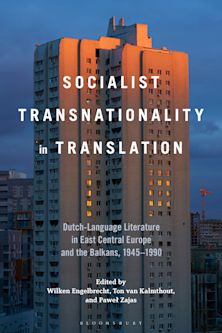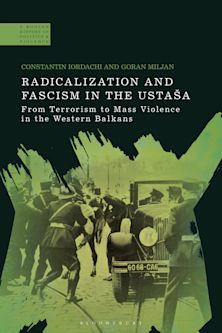- Home
- ACADEMIC
- Politics & International Relations
- Balkan Studies
- The Making of Modern Kosovo
The Making of Modern Kosovo
Reassessing Ibrahim Rugova’s Policy of Non-Violence
The Making of Modern Kosovo
Reassessing Ibrahim Rugova’s Policy of Non-Violence
You must sign in to add this item to your wishlist. Please sign in or create an account
Description
This book traces the origins and success of Ibrahim Rugova's policy of nonviolence in Kosovo between 1989–1999 and how it laid the framework for the creation of Kosovo's cultural and political identity as an independent state.
Ibrahim Rugova has long been neglected in understanding how Kosovo became an independent state, with most observers concentrating on the Kosovo Liberation Army and the armed conflict of 1999 in which NATO was involved. Jakup Azemi seeks to remedy this, arguing that despite the events of 1998/99, local actors and their political organisation mattered much more than is widely recognised. Rugova's movement represented a novelty not only for the Albanians but for the whole Balkan region. He developed a vision that integrated Albanians' cultural and historical experiences into the non-violent movement and presented the Kosovan conflict to the world with a different political and cultural lens.
This is a key text for scholars interested in the history of the Kosovar liberation movement, the dissolution of the former Yugoslavia; and those looking at current issues in the Western Balkans, and the Albanian-Kosovar relationship.
Table of Contents
Preface
Acknowledgments
Abbreviations
Introduction
Structure of the Book
Chapter 1. The Rise of Ibrahim Rugova and the Emergence of his Policy of Non-violence
Chapter 2. Non-violence and the Albanian Culture
Chapter 3. The Institutional Set-Up: The Parallel State of Kosovo
Chapter 4. The Internationalization of the Kosovo Conflict
Chapter 5. Transformation from a Non-violent to Violent Conflict
Chapter 6. The Epilogue
Chapter 7. Conclusion: Rugova's Political Legacy
Bibliography
Index
Bibliography
Index
Product details

| Published | 26 Jun 2025 |
|---|---|
| Format | Ebook (PDF) |
| Edition | 1st |
| Extent | 256 |
| ISBN | 9781350460089 |
| Imprint | Bloomsbury Academic |
| Publisher | Bloomsbury Publishing |
About the contributors
Reviews
-
A fascinating analysis of Rugova's policy of non-violence in Kosovo… Azemi's argument is authoritative and should be read by all who seek to understand Kosovo's historical evolution.
Aidan Hehir, University of Westminster, UK
-
Ibrahim Rugova is often referred to as “neo-Gandhian”. His policy of non-violent resistance should not be misunderstood as weakness. It was a calculated strategy to mobilize international support for Kosovo's independence. Obdurate and determined, Rugova sought to avoid a blood bath by using passive resistance to advance Kosovo's national aspirations. He ranks alongside Nelson Mandela and the Dalai Lama as great champions of peace”.
David L Phillips, Columbia University, USA

ONLINE RESOURCES
Bloomsbury Collections
This book is available on Bloomsbury Collections where your library has access.


































